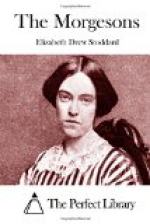“Are you going away again soon?” Alice asked him presently.
“No.”
“To keep Cassandra, I intend to ask Mrs. Morgeson to come again. Will you write Mr. Morgeson to urge it?”
“Yes.”
“I shall ask them to give up Cass altogether to us.”
“You like her so much, do you, Alice?”
His voice sounded far off and faint.
Again I refrained from speaking my resolution of going home. I would give up thinking of it even! I felt again the tension of the chain between us. That night I ceased to dream of him.
“My letter is from Helen, Alice,” I said.
“When did you see Somers?” Charles asked.
“To-day. I have an idea he will not remain here long.”
“He is an amusing young man,” Alice remarked.
“Very,” said Charles.
Helen’s letter was long and full of questions. What had I done? How had I been? She gave an account of her life at home. She was her father’s nurse, and seldom left him. It was a dreary sort of business, but she was not melancholy. In truth, she felt better pleased with herself than she had been in Rosville. She could not help thinking that a chronic invalid would be a good thing for me. How was Ben Somers? How much longer should I stay in Rosville? It would know us no more forever when we left, and both of us would leave it at the same time. Would I visit her ever? They lived in a big house with a red front door. On the left was a lane with tall poplars dying on each side of it, up which the cows passed every night. At the back of it was a huge barn round which martins and pigeons flew the year through. It was dull but respectable and refined, and no one knew that she was tattooed on the arm.
I treasured this letter and all she wrote me. It was my first school-girl correspondence and my last.
Relations of Alice came from a distance to pay her a visit. There was a father, a mother, a son about twenty-one, and two girls who were younger. Alice wished that they had stayed at home; but she was polite and endeavored to make their visit agreeable. The son, called by his family “Bill,” informed Charles that he was a judge of horseflesh, and would like to give his nags a try, having a high-flyer himself at home that the old gentleman would not hear of his bringing along. His actions denoted an admiration of me. He looked over the book I was reading or rummaged my workbox, trying on my thimble with an air of tenderness, and peeping into my needlebook. He told Alice that he thought I was a whole team and a horse to let, but he felt rather balky when he came near me, I had such a smartish eye.
“What am I to do, marm?” asked Jesse one morning when Charles was away. “That ere young man wants to ride the new horse, and it is jist the one he mus’n’t ride.”
“I will speak to Cousin Bill myself,” she said.
“He seems a sperrited young feller, and if he wants to break his neck it’s most a pity he shouldn’t.”




